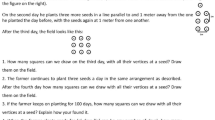Abstract
Children aged between 4 years 6 months and 9 years 10 months were individually administered a series of novel tasks involving the formation of different combinations of two items, selected from discrete sets of items. An analysis of the children's performance revealed a series of six, increasingly sophisticated, solution strategies ranging from a random selection of items through to a systematic pattern in item choice (cf. Piaget and Inhelder's, 1975, combinatoric operations). A significant number of children independently adopted more efficient solution procedures as they progressed on the tasks, with many displaying an algorithmic procedure reflecting the “odometer strategy” (holding one item constant while systematically varying each of the other items). Given that children as young as 7 years demonstrated this systematic strategy, it would appear that, within the appropriate learning environment, young children can discover a procedure for forming n x n combinations prior to the stage of formal operations postulated by Piaget and Inhelder. The findings support the inclusion of the combinatorial domain as a topic of investigation in the elementary school curriculum.
Similar content being viewed by others
References
Anderson, J.: 1985, Cognitive Psychology and its Implications, W.H. Freeman & Company, New York.
Bruner, J.: 1985, ‘On teaching thinking: An afterthought’, in S. F.Chipman, J. W.Segal, and R.Glaser (eds.), Thinking and Learning Skills, Vol. 2: Current Research and Open Questions, Lawrence Erlbaum, Hillsdale, New Jersey.
Carey, S.: 1985, ‘Are children fundamentally different kinds of thinkers and learners than adults?’, in S. F.Chipman, J. W.Segal, and R.Glaser (eds.), Thinking and Learning Skills, Vol. 2: Current Research and Open Questions, Lawrence Erlbaum, Hillsdale, New Jersey.
DeLoache, J. S., Sugarman, S., and Brown, A. L.: 1985, ‘The development of error correction strategies in young children's manipulative play’, Cognitive Development 56, 928–939.
Dias, M. G. and Harris, P. L.: 1988, ‘The effect of make-believe play on deductive reasoning’, British Journal of Developmental Psychology 6, 207–221.
Donaldson, M.: 1985, ‘The mismatch between school and children's minds’, in N.Entwistle (ed.), New Directions in Educational Psychology, 1: Learning and Teaching, The Falmer Press, London.
English, L. D.: 1991, ‘Young children as independent learners’, in G.Evans (ed.), Learning and Teaching Cognitive Skills, ACER Monograph Series on Cognitive Processes and Education, The Australian Council for Educational Research, Melbourne.
English, L. D.: 1988, Young Children's Competence in Solving Novel Combinatorial Problems, Unpublished PhD thesis, University of Queensland, Australia.
Ennis, R.: 1975, ‘Children's ability to handle Piaget's propositional logic: A conceptual critique’, Review of Educational Research 45(1), 1–41.
Eysenck, M.: 1984, A Handbook of Cognitive Psychology, Lawrence Erlbaum, Hillsdale, New Jersey.
Fabricius, W. V., Sophian, C., and Wellman, H. M.: 1987, ‘Young children's sensitivity to logical necessity in their inferential search behaviour’, Child Development 58, 409–423.
Fischer, K. W.: 1980, ‘A theory of cognitive development: The control and construction of hierarchies of skills’, Psychological Review 87(6), 477–531.
Flavell, J. H.: 1963, The Developmental Psychology of Jean Piaget, D. Van Nostrand Company, New York.
Gelman, R. and Greeno, J.: 1989, ‘On the nature of competence: Principles for understanding in a domain’ in L.Resnick (ed.), Knowing, Learning, and Instruction, Lawrence Erlbaum, Hillsdale, New Jersey.
Ginsburg, H.: 1985, ‘Piaget and education’, in N.Entwistle (ed.), New Directions in Educational Psychology, 1: Learning and Teaching, The Falmer Press, London.
Greeno, J. G., Riley, M. S., and Gelman, R.: 1984, ‘Conceptual competence and children's counting’, Cognitive Psychology 16, 94–143.
Inhelder, B. and Piaget, J.: 1958, The Growth of Logical Thinking: From Childhood to Adolescence, Routledge and Kegan Paul, London.
Karmiloff-Smith, A.: 1984, ‘Children's problem solving’, in M.Lamb, A.Brown, and B.Rogoff (eds.), Advances in Developmental Psychology, Vol 3, Lawrence Erlbaum, Hillsdale, New Jersey.
Levine, S.: 1983, ‘The child-as-philosopher: A critique of the presuppositions of Piagetian theory and an alternative approach to children's cognitive capacity’, Thinking: The Journal of Philosophy for Children 5(1), 1–11.
Piaget, J. and Inhelder, B.: 1975, The Origin of the Idea of Chance in Children, W.W. Norton & Company, New York.
Scardamalia, M.: 1977, ‘Information processing capacity and the problem of horizontal decalage: A demonstration using combinatorial reasoning tasks’, Child Development 48, 28–37.
Varga, T.: 1969, ‘Combinatorials and probability for young children’, Part 1, Journal of Structural Learning 1, 49–99.
Whitney, H.: 1985, ‘Taking responsibility in school mathematics education’, The Journal of Mathematical Behaviour 4(3), 219–235.
Author information
Authors and Affiliations
Rights and permissions
About this article
Cite this article
English, L.D. Young children's combinatoric strategies. Educ Stud Math 22, 451–474 (1991). https://doi.org/10.1007/BF00367908
Issue Date:
DOI: https://doi.org/10.1007/BF00367908




